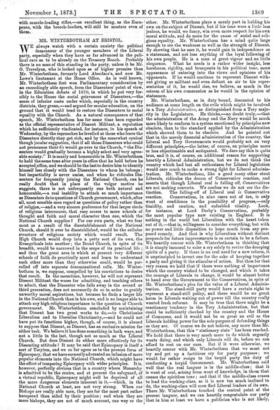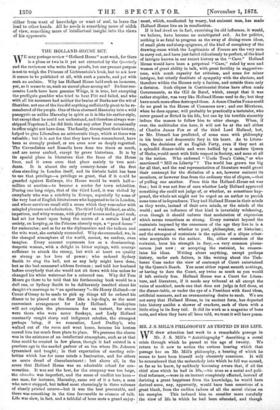MR. WINTERBOTHAM AT BRISTOL, W E always watch with a certain
anxiety the political demeanour of the younger members of the Liberal party, especially when they have so far advanced in the poli- tical race as to be already on the Treasury Bench. Probably there is no man of this standing in the party, unless it be Mr. G. Trevelyan, who is looked upon as of higher promise than Mr. Winterbotham, formerly Lord Aberdare's' and now Mr. Lowe's lieutenant at the Home Office. As is well known, Mr. Winterbotham first won Parliamentary consideration by an exceedingly able speech, from the Dissenters' point of view, in the Education debate of 1870, in which he put very for- cibly to the House the social grievances of Dissenters,—the sense of inferior caste under which, especially in the country districts, they groan,—and argued for secular education, on the ground that it would tend to restore the Dissenters to social equality with the Church. As a natural consequence of that speech, Mr. Winterbotham has for some time been regarded as the official representative of Dissent Militant, a reputation which he sufficiently vindicated, for instance, in his speech of Wednesday, by the reproaches he levelled at those who leave the Dissenters directly they get rich, and by the somewhat cynical though jocular suggestion, that if all those Dissenters who could not pronounce their h's would go over to the Church, "the Dis- senters would gradually become a highly select and very agree- able society." It is manly and honourable in Mr. Winterbotham to hold the same tone after years in office that he held before he acceptedoffice, and we should be the last to desire him to identify himself less closely with the Dissenters to whom he belongs; but impartiality is never amiss, and when he ridicules Dis- senters for frequently joining the National Church, can he really doubt that in place of the vulgar motive he suggests, there is not unfrequently one both natural and honourable,—a real inability to attach so much importance as Dissenters dotoquestions of Church government, which,after all, most sensible men regard as questions of policy rather than of religjon,—and a very sincere preference for that larger circle of religious intercourse, that easy access to more schools of thought and faith and moral character than one, which the National Church supplies ? For our own parts, what we fear most as a result of the disestablishment of the National Church, should it ever be disestablished, would be the cellular structure of religious society which would result. The High Church would drop into a petty sect of its own, the Evangelicals into another ; the Broad Church, in spite of its breadth, would be narrowed in the scope of its practical life'; and thus the great area in which at present very different schools of faith do practically meet and learn to understand each other more than they otherwise could, would be par- celled off into separate denominational cells. Mr. Winter- botham is, we suppose, compelled by his convictions to desire that result. In the meantime, however, he will not represent Dissent Militant the worse for admitting, and teaching others to admit, that the Dissenter who falls away in the second or third generation, does not necessarily do so in order to gratify unworthy moral aspirations, but because he finds a larger life in the National Church than in his own, and is no longer able to attach any high religious importance to the question of Church government. Mr. Winterbotham concluded by maintaining that Dissent has two great works to do,—to Christianise Liberalism and to liberalise Christianity,—and he could not have put its functions higher, though, of course, it is absurd to suppose that Dissent, as Dissent, has an exclusive mission for either task. We believe it-has done something in both ways, and not a little in the last, though not so much as the Liberal Church. But does Dissent do either more effectively for its Dissenting attitude ? It may be said that Episcopacy is itself a sort of Toryism, and we so far agree as to the present form of Episcopacy, that we have earnestlyadvocated an infusion of more popular elements into the National Church, which might have the effect of tempering Episcopacy with wider principles. It is, however, perfectly obvious that in a country where Monarchy is admitted to be the centre, and at present the safeguard, of a virtual republic, Episcopacy might well be deprived of all the more dangerous elements inherent in it,—which, in the National Church at least, are not very strong. When our Bishops are really able men, they are for the most part rather hampered than aided by their position ; and when they are mere bishops, they are not of much account, one way or the other. Mr. Winterbotham plays a manly part in holding his own on the subject of Dissent, but if his tone were a little less jealous, he would, we fancy, win even more respect for his own moral attitude, and do more for the cause of social and reli- gious equality. Mr. Winterbotham has a mind quite large enough to see the weakness as well as the strength of Dissent. By showing that he sees it, he would gain in independence as a statesman, and not lose anything of the loyal following of his own people. He is a man of great vigour and no little eloquence. What he needs is a rather wider insight, less harshness, rigidity, and brusquerie in his political tone, more appearance of entering into the views and opinions of his opponents. If he would continue to represent Dissent with- out giving so militant and even defiant an air to his repre- sentation of it, he would rise, we believe, as much in the esteem of his own communion as he would in the opinion of statesmen.
Mr. Winterbotham, as in duty bound, descanted to his audience at some length on the evils which might be involved in a Tory Administration, as distinguished from a Tory majo- rity in the Legislature. He thinks,—no doubt truly,—that the administration of the Army and the Navy would be much more likely to conform to a system sanctioned by principles now obsolete, than to the standard applied by the Administration which showed them to be obsolete. And he pointed out that in the merely financial administration of the country, the Liberal and Tory Governments would probably act on very different princIples,—the latter, of course, on principles more or less objectionable and antiquated. We dare say this is quite true, and it is, of course, an additional reason for supporting heartily a Liberal Administration, but we do not think the country which had lost all enthusiasm for Liberal legislation would care much to make a strong fight for Liberal a.dminis. tration. Mr. Winterbotham, like a good many other stout Liberals, ridicules the dream of Conservative reaction, and asserts that though Liberal zeal is falling off, Conservatives are not making converts. We confess we do not see the dis- tinction. The falling-off of Liberal zeal is Conservative reaction. Conservatism, in nine cases out of ten, is only want of confidence in the possibility of progress,—only timidity, and caution, and enfeebled vitality. Look, for instance, at Lord Derby's Conservatism, probably the most popular type now existing in England. It ia nothing in the world but Liberalism with the heart taken out of it,—that is, willingness to consider everything, but with no power and little disposition to hope much from any pro- posed remedy. And that is why Liberalism without distinct proposals for future improvements is so certain to be a failure. We heartily concur with Mr. Winterbotham in thinking that it is simply immoral to raise a cry solely to revive the drooping spirits of a party. If there is no real need for a new reform, it is unprincipled to invent one for the sake of keeping together a party and giving it the stimulus of action. But then for that very reason we hold that if there were nothing of importance which the country wished to be changed, and which it takes the courage of Liberals to change, it would be almost better to hand over the Government to the Conservatives, in spite of Mr. Winterbotham's plea for the value of a Liberal Adminis- tration. The stand-still party would have a certain right to represent a stand-still policy, and there would be no great harm in Liberals waiting out of power till the country really wanted fresh reforms. It may be true that there might be a reactionary tendency in the Tory Administration, but that could be sufficiently checked by the country and the House of Commons, and it would not be so great an evil as the Liberals holding power for the sole purpose of defending things as they are. Of course we do not believe, any more than Mr. Winterbotham, that this "stationary state" has been reached. We hold that there is very much more to do which urgently wants doing, and which only Liberals will do, before we can afford to rest on our oars. But if it were otherwise, we heartily concur with Mr. Winterbotham that we must not try and get up a factitious cry for party purposes ; we would far rather resign to the torpid party the duty of conducting a torpid Government. Mr. Winterbotham said well that the real languor is in the middle-class ; that it is want of zeal, arising from want of knowledge, in them that causes the spiritless tone ; and that if the middle-class ceases to lead the working-class, as it is now too much inclined to do, the working-class will soon find Liberal leaders of its own. There Mr. Winterbotham touched the central point of the present languor, and we can heartily congratulate our party - that in him at least we have a politician who is not likely,
either from want of knowledge or want of zeal, to leave the lead to other hands. All he needs is something more of width of view, something more of intellectual insight into the views of his opponents.



































 Previous page
Previous page